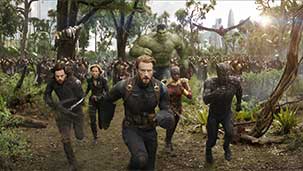This opening paragraph is where I tie your job thematically into Avengers: Infinity War to create the basis for the review I’m writing. I have to admit, though, that choosing you is little more on-the-nose than usual — for a couple of reasons. First, all of Dear Cast & Crew’s previous reviews for Avengers films have been written to a Jared, so you help maintain that continuity (the MCU is all about continuity, after all). Second, your actual job on the movie, to “stand-in”, accurately describes what Avengers: Infinity War felt like for for me: a stand-in for something to come later.
Yes, Infinity War represents the culmination of 10 years worth of universe-building, bringing together the characters and plot threads from 18 films. But as I left the theatre (staying dutifully for the post-credits stinger, natch), I couldn’t set aside the feeling that I hadn’t really seen the main event. Don’t get me wrong: there’s plenty to like here. We are, after all, fully introduced to super-sized villain Thanos, after multiple teases in previous films. And his plan to restore balance to the universe by instantly killing half its population (using the infinity stones vaguely detailed at various times in past movies) is an interesting point of abstraction, despite its wobbly logic.
But the real star here is the interactions from the characters coming together. After a few opening skirmishes (one of which infuriatingly undoes most of what Taika Watiti did in Thor: Ragnarok with the same casual disdain David Fincher threw James Cameron’s way in Alien 3), the various heroes are dispersed across the galaxy in groupings arranged for maximum entertainment value.
A lot of these are pretty funny, too. The MCU is nothing if not chock-full of top-tier acting talent, and most of the cast does a fine job making their characters sparkle. Tom Holland, Benedict Cumberbatch, and Robert Downey Jr. have an easy, snarky chemistry in their off-work adventures, and Chris Hemsworth’s Thor continues to prove the funniest Marvel hero. Unfortunately, Chris Pratt is saddled with s poorly written arc — which may have contributed to the Harrison-Ford-in-Return-of-the-Jedi boredom that infects his performance. Other long-time stalwarts Chris Evans and Scarlett Johansson are left with little to do.
That’s partially because in essence, Infinity War is Thanos’ movie. It actually functions as a kind of origin story for the villain, with his quest connecting all the disparate shenanigans of the heroes. Even the ending supports this reading. While this is conceptually and formally interesting, it’s not particularly satisfying narratively.
What’s that, you (or, at least, some fans) say? That this isn’t supposed to have narrative closure because it’s part one of a two-part tale? Fair enough. I can wait and judge this as whole, even if the fact that this is a two-parter was hidden from casual movie-goers, and feels like part of the marketing ploy.
Hardcore Marvel fans—and anyone who follows movies in general—had inklings that Infinity War would most likely take place over one or more films — and that knowledge is part of what left me cold exiting the theatre. Based on the economics of modern filmmaking, the ending of Infinity War rings almost laughably hollow. A quick reading of release schedules in The Hollywood Reporter could undo all of Thanos’ achievements more effectively than any Avenger.
I’m the first one, however, to hide behind my New Critic shield, chanting, mantra-like, “extra-textual information should not influence its reading.” Fine.
This led to a few post-film discussions with the more comic-savvy critics in the group (qv previous Jared) about structure, genre, and storytelling. Comic books, after all, have a rich history of endings that run back into beginnings, stories that span multiple issues or even titles before offering any closure. I get it. My problem with that is, we’re back to using that old canard, extra textual reference points.
So, Jared, what’s a critic to do? When in doubt, I like to look at the filmmaking. Sadly, there’s not much to report on this front. Infinity War is a pretty flat exercise, visually; and all the more surprising, given The Russo Brothers previous directorial efforts, especially Captain America: The Winter Soldier. Where that film took its inspiration from paranoid 70s thrillers to inject something new into the kicking and punching genre, Infinity War has no distinct style at all. It’s as if mashing all those characters together made Infinity War’s visuals the equivalent of mixing all the paints: it’s the stylistic equivalent of brown.
Settings feel generic and ill-defined. A climactic battle set on a grassy plain near the film’s climax, meant to work on the scale of the battle of Helm’s Deep in The Two Towers, looks flat and uninspired. It’s as if the Marvel FX team bought the daylight set left over after their DC rivals pillaged all the bargain-bin nighttime and rain CGI backgrounds. Watching it, the only reference point that came to mind was the end of The Phantom Menace. I feel like we can all do better.
Still, I’m coming off as more down on this than I mean to. There is fun to be had — and if someone’s invested over 38 hours in the previous entries, what’s another two hours and forty minutes? Besides, if this really is a stand-in for the real show to come, we all know it’s the next few hours that will count.
Or else I’ll be angry. And you won’t like me when I’m-- See? Now I’m even joining in.
Fine, Marvel, you win.
Floating away,
Casey







